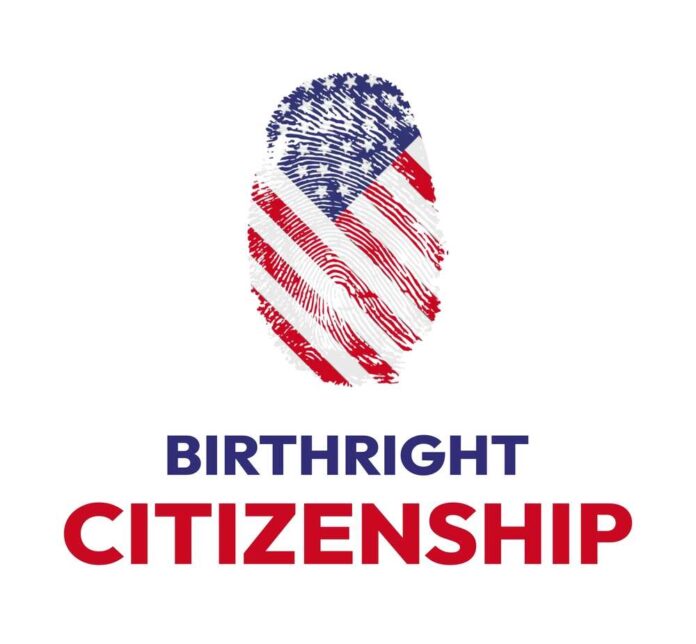
Undocumented pregnant woman fears for her unborn child’s future as Trump’s executive order threatens to end birthright citizenship.
President Trump’s executive order challenging birthright citizenship has sparked widespread concern among expectant mothers, particularly those who are undocumented. The order, which aims to deny automatic citizenship to children born to non-citizens on U.S. soil, faces significant legal hurdles and constitutional challenges. As the debate intensifies, families caught in the crossfire are grappling with uncertainty about their children’s future status in America. The order’s attempt to reinterpret the 14th Amendment has ignited a fierce legal battle, with states and civil rights organizations rushing to block its implementation.
A Tale of Two Cousins: The Human Face of the Birthright Citizenship Debate
Andrea Chavez, an undocumented immigrant, recently gave birth to a child in Maryland who promptly received a Social Security number. Her cousin, Maria Calderas, also undocumented and pregnant, now faces a starkly different reality. The contrast between their situations starkly illustrates the potential impact of Trump’s executive order, signed on his first day back in office. This move to end birthright citizenship for children born to undocumented immigrants in the U.S. has sent shockwaves through immigrant communities.
The order’s implications are far-reaching, threatening to upend a constitutional principle that has stood for over 160 years. Changing birthright citizenship isn’t as simple as signing an executive order; it would typically require a constitutional amendment. But that hasn’t stopped the administration from blazing ahead with its controversial agenda.
Legal Battlegrounds: States and Civil Rights Groups Fight Back
As soon as the ink dried on Trump’s order, the legal challenges began. State coalitions and the ACLU have filed lawsuits, arguing that the order blatantly violates the 14th Amendment. Legal experts are nearly unanimous in their opinion that the order contradicts the Constitution, but the administration seems hell-bent on pushing its hardline immigration policies, Constitution be damned.
“It worries me that the new president doesn’t want to give citizenship to our baby,” she said. “This is where he will go to school and grow up. He will speak English like an American.” – Ms. Calderas
With the order set to take effect just 30 days after January 20, the clock is ticking for expectant mothers like Calderas. The anxiety among undocumented immigrants is palpable, as they face the prospect of their American-born children being denied the rights and protections of citizenship.
The Human Cost of Political Posturing
Calderas, who fled Guatemala seeking a better life, now finds herself at the center of a political maelstrom. Her concerns about her child’s future in the U.S. aren’t just about legal status; they’re about the fundamental right to belong. The idea that her child, born on American soil, might be denied the opportunity to fully integrate into the only society they’ll ever know is a bitter pill to swallow.
It’s a stark reminder of the human cost of political posturing. While politicians and pundits debate the finer points of constitutional law, real families are left in limbo, their futures hanging in the balance. The irony is thick: in trying to “protect” American citizenship, the administration may be creating a new underclass of American-born non-citizens, further complicating an already broken immigration system.
A Nation Divided: The Birthright Citizenship Battleground
As the legal challenges mount and the debate rages on, one thing is clear: the issue of birthright citizenship has become yet another battleground in America’s increasingly divided political landscape. On one side, those who see the 14th Amendment as a fundamental pillar of American values and identity. On the other, those who view it as a loophole to be closed in the name of immigration control.
“Can you summarize what birthright citizenship is and why it’s going to get messy with Trump’s executive order trying to end it?
Also does this apply to children already born in the U.S. to parents who are not currently citizens or green card holders?”https://t.co/8Wq7nfwtna
— 🖤 Christine (@christinelu) January 21, 2025
But let’s cut through the bullshit for a moment. This isn’t really about the Constitution or immigration policy. It’s about power, plain and simple. It’s about a political class that’s more interested in scoring points and riling up its base than in actually solving problems. And who pays the price? People like Maria Calderas and her unborn child, caught in the crossfire of a political war they never asked to be part of.
The Road Ahead: Uncertainty and Resistance
As the legal battles unfold and the 30-day countdown continues, immigrant communities and their advocates are mobilizing. Information sessions, legal clinics, and protest rallies are being organized across the country. The message is clear: this fight is far from over.
But for women like Calderas, the future remains uncertain. Will her child be a citizen of the country they’re born in, or a stranger in their own land? Only time, and the courts, will tell. In the meantime, expectant mothers across America wait, hope, and pray that the promise of the 14th Amendment – “All persons born or naturalized in the United States, and subject to the jurisdiction thereof, are citizens of the United States” – will continue to ring true.




















